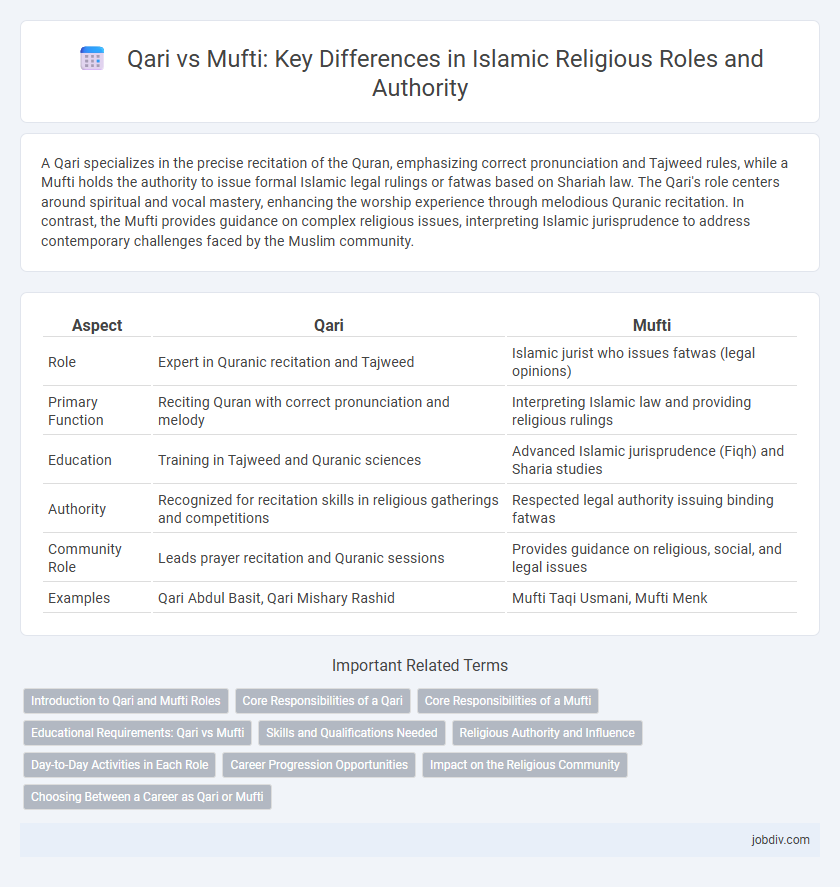A Qari specializes in the precise recitation of the Quran, emphasizing correct pronunciation and Tajweed rules, while a Mufti holds the authority to issue formal Islamic legal rulings or fatwas based on Shariah law. The Qari's role centers around spiritual and vocal mastery, enhancing the worship experience through melodious Quranic recitation. In contrast, the Mufti provides guidance on complex religious issues, interpreting Islamic jurisprudence to address contemporary challenges faced by the Muslim community.
Table of Comparison
| Aspect | Qari | Mufti |
|---|---|---|
| Role | Expert in Quranic recitation and Tajweed | Islamic jurist who issues fatwas (legal opinions) |
| Primary Function | Reciting Quran with correct pronunciation and melody | Interpreting Islamic law and providing religious rulings |
| Education | Training in Tajweed and Quranic sciences | Advanced Islamic jurisprudence (Fiqh) and Sharia studies |
| Authority | Recognized for recitation skills in religious gatherings and competitions | Respected legal authority issuing binding fatwas |
| Community Role | Leads prayer recitation and Quranic sessions | Provides guidance on religious, social, and legal issues |
| Examples | Qari Abdul Basit, Qari Mishary Rashid | Mufti Taqi Usmani, Mufti Menk |
Introduction to Qari and Mufti Roles
A Qari is a person skilled in the recitation of the Quran with proper pronunciation, intonation, and rhythm, serving primarily as a Quranic reciter and teacher. A Mufti is an Islamic scholar authorized to issue fatwas, or religious legal opinions, based on Islamic law (Sharia) and jurisprudence (fiqh). Both roles are essential in the Islamic community, with the Qari focusing on preserving Quranic recitation and the Mufti providing authoritative guidance on religious and legal matters.
Core Responsibilities of a Qari
A Qari is primarily responsible for the precise and melodious recitation of the Quran, ensuring Tajweed rules are strictly followed to preserve the sacred text's phonetic integrity. This role demands extensive training in Quranic phonetics, intonation, and rhythm to inspire spiritual connection during prayer and religious ceremonies. Unlike a Mufti, who issues legal rulings and interpretive judgments, the Qari's core expertise lies in vocal recitation that upholds tradition and enhances communal worship.
Core Responsibilities of a Mufti
A Mufti's core responsibilities include issuing authoritative fatwas based on Islamic jurisprudence to guide the community in religious and legal matters. Unlike a Qari, who specializes in reciting the Quran with proper Tajweed, a Mufti interprets Sharia law to resolve complex theological and social issues. Their expertise in fiqh ensures accurate application of Islamic principles in everyday life.
Educational Requirements: Qari vs Mufti
A Qari specializes in the precise recitation of the Quran, requiring rigorous training in Tajweed, memorization, and auditory skills, often studied under skilled reciters or in specialized Quranic institutes. A Mufti undergoes extensive advanced Islamic education, including deep studies in Fiqh (Islamic jurisprudence), Hadith, Quranic exegesis, and Arabic language, usually earning degrees from recognized Islamic universities or seminaries. The educational path for a Mufti is lengthier and more comprehensive, preparing them to issue fatwas and provide legal-religious guidance, while a Qari's focus remains on perfecting and transmitting Quranic recitation.
Skills and Qualifications Needed
Qari requires specialized skills in precise Quranic recitation, mastery of Tajweed rules, and vocal ability to convey emotional depth while preserving accurate pronunciation. Mufti demands extensive Islamic jurisprudence knowledge, proficiency in deriving legal rulings from Sharia, and deep understanding of classical Arabic and Hadith sciences. Both roles necessitate rigorous religious education, but Qari focuses on oral artistry, whereas Mufti emphasizes scholarly interpretation and legal expertise.
Religious Authority and Influence
Qaris are renowned for their mastery in Quranic recitation, emphasizing vocal precision and spiritual connection, which grants them significant influence in religious ceremonies and educational settings. Muftis hold authoritative religious legal knowledge, issuing binding fatwas that guide Islamic jurisprudence and community practices, thus wielding substantial influence in legal and theological matters. The authority of a Mufti often surpasses that of a Qari due to their role in interpreting Sharia law and shaping religious norms within the Muslim community.
Day-to-Day Activities in Each Role
A Qari specializes in the precise recitation of the Quran, often leading prayers and guiding others in correct pronunciation and tajweed rules during daily worship and religious events. A Mufti's daily responsibilities revolve around issuing fatwas, interpreting Islamic law, and providing scholarly advice to individuals and communities on religious and legal matters. While the Qari's activities center on spiritual recitation and auditory teaching, the Mufti's role emphasizes jurisprudential decision-making and personalized religious guidance.
Career Progression Opportunities
Qaris can advance their careers by participating in international Quran recitation competitions and securing roles as instructors or judges in renowned Islamic institutions. Muftis typically progress through formal Islamic legal education, gaining appointments as senior jurists, advisory members in fatwa councils, or academic lecturers in fiqh. The career trajectory of a Mufti generally involves deeper specialization in Islamic jurisprudence, while Qaris emphasize skill refinement and public recognition in Quranic recitation.
Impact on the Religious Community
Qaris enhance the religious community by preserving the Quran's oral tradition and promoting spiritual connection through precise recitation, which strengthens communal worship and religious identity. Muftis provide authoritative legal guidance and interpret Islamic jurisprudence, enabling believers to apply religious laws to contemporary issues, thereby ensuring social cohesion and moral clarity. Both roles are essential in maintaining the balance between spiritual devotion and practical religious governance in the community.
Choosing Between a Career as Qari or Mufti
Choosing between a career as a Qari or Mufti depends on one's affinity for Quranic recitation versus Islamic jurisprudence. A Qari specializes in the artful and precise recitation of the Quran, emphasizing tajweed and spiritual impact during public or private sermons. Conversely, a Mufti is an Islamic legal expert responsible for issuing fatwas, relying on deep knowledge of Sharia, fiqh, and Quranic interpretation to guide communal or individual religious matters.
Qari vs Mufti Infographic

 jobdiv.com
jobdiv.com